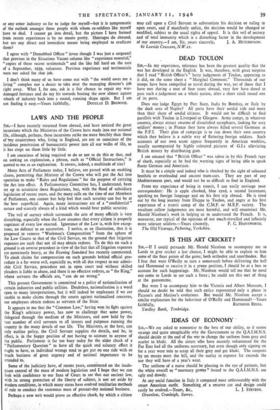LAWS AND THE PEOPLE
SIR,—I have recently returned from abroad, and have noticed the great incursions which the Ministries of the Crown have made into our national life, although, perhaps, these incursions strike me more forcibly than those of 'my countrymen who, living in England, are not so conscious of the insidious penetration of bureaucratic power into all our walks of life, as it has crept on them little by little.
I am conscious of being required to do or not to do this or that, and on seeking an explanation, a phrase, such as "Official Instructions," is quoted to me as an explanation. It covers, indeed, a multitude of sins!
Many Acts of Parliament today, I believe, are passed with an enabling clause, permitting that Minister of the Crown who will put the Act into operation to make "Rules and Regulations" for the purpose of carrying • the Act into effect. A Parliamentary Committee has, I understand, been set up to scrutinise these Regulations, but, with the flood of subsidiary legislation of recent years, and the many calls on the time of our Members of Parliament, one cannot but help feel that such scrutiny can but be at the best superficial. Again, many instructions are of a "confidential" nature and scarcely always of a kind which would bear public scrutiny.
The veil of secrecy which surrounds the acts of many officials is Very disturbing, especially when the Law assumes that every citizen is properly cognizant of every law enacted. Ignorance of the Law is, with few excep- tions, no defence to an accusation. I notice, as an illustration, that it is proposed to remove "Workmen's Compensation" from the sphere of the Law Courts to that of the Civil Service, on the ground that litigation expenses are such that not all may obtain redress. To do this on such a ground is an unwise precedent in view of the fact that all litigation expenses are notoriously heavy, as the Evening Standard has recently commented. To cloak claims for compensation on such grounds behind official pro- cedure is a far worse evil, especially as, with all due respect to our admir- able Civil Service, procedure not in open court and without skilled pleaders is liable to abuse, and there is no effective redress, as "the King," whose servants the officials are, "can do no wrong."
This present Government is committed to a policy of nationalisation of certain industries and public utilities. Doubtless, nationalisation is a word open to many interpretations, but it will indeed be unpleasant if we are unable to make claims through the courts against nationalised concerns, nor employees obtain redress as servants of the State.
It appears to me that the "Common Law," having won its fight against the King's arbitrary power, has now to challenge that same power, delegated through the medium of the Ministers, and now held by the vast number of civil servants to all intents and purposes running the country in the many details of our life. The Ministers, at the best, can only outline policy, the Civil Servant supplies the details, and he, in effect, is in the happy position of not having to account to anyone of the public. Parliament is far too busy today for the older check of a "Parliamentary Question" to have all the quick and salutary effect it ought to have, as individual wrongs tend to get put on one side with so much business of great urgency and of national importance to be attended to..
Some of the judiciary have, of recent years, commented on the inade- quate control of the mass of modern legislation and I hope that we can look with confidence to our Inns of Court to see that our ancient law, with its strong protection of the liberty of subject, is not set aside by modern conditions, in which many states have evolved totalitarian methods of rule to conduct the enormous mass of present-day national business.
Perhaps a new writ would prove an effective check, by which a citizen
may call upon a Civil Servant to substantiate his decision or ruling in open court, and if Manifestly unfair, the decision would be changed or modified, subject to the usual rights of appeal. It is this veil of secrecy and of total immunity which is a disturbing factor in the development
of our country.—I am, Sir, yours sincerely, J. A. HUTCHINSON. 6i Leeside Crescent, N.W .1 1.






























 Previous page
Previous page